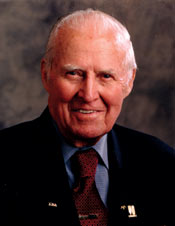
Iowa native and Nobel Peace Prize Laureate committed his life to fighting world hunger
Dr. Norman E. Borlaug, the man who "saved more lives than any other person who has ever lived," has died. He was 95 years old.
Dr. Borlaug was believed to have saved more than a billion lives through his breakthrough work in agriculture. In 1970 he won the Nobel Peace Prize for averting massive famine by starting the "Green Revolution," the greatest period of food production in human history.
Norman Ernest Borlaug was born in the small northeast Iowa community of Cresco on March 25, 1914. After earning a Ph.D. in Plant Pathology from the University of Minnesota, he joined a Rockefeller Foundation research project in Mexico in 1944. There, over the next two decades, he developed a "miracle wheat" that tripled grain output and moved the country to self-sufficiency. Dr. Borlaug then took his high-yield, disease-resistant wheat to Pakistan and India, averting the mass famine and starvation that had been widely predicted.
For this, he was awarded the 1970 Nobel Peace Prize, the only time in its history the award was given for achievements in agricultural science. Dismayed that there was no award for significant breakthroughs in food and agriculture, Dr. Borlaug set out to create an award of his own. In 1986, Dr. Borlaug founded the World Food Prize to recognize life-saving achievements that increase the quality, quantity or availability of food in the world. In 1990, in partnership with Des Moines businessman and philanthropist John Ruan, the Prize was moved to Des Moines. Now in its 23rd year, the award is often referred to as the "Nobel Prize for Food and Agriculture." The World Food Prize also hosts: an international symposium, The Borlaug Dialogue, which attracts leading agricultural experts from around the world to discuss cutting-edge topics in global food security; and a Youth Institute for high school students that was a special favorite of Dr. Borlaug.
Dr. Borlaug spent his later years committed to extending the Green Revolution to Africa, heading the Sasakawa Global 2000 program. He also continued his relationship with the International Maize and Wheat Improvement Center in Mexico, and traveled extensively throughout the world most of the year. He returned to the United States each year to teach a course at Texas A&M University and to attend the World Food Prize events in Des Moines.
"The world has lost a great hero," said Ambassador Kenneth M. Quinn, President of the World Food Prize. "Dr. Borlaug's tireless commitment to ending hunger had an enormous impact on the course of history. He will be remembered with love and appreciation around the globe."
In addition to the Nobel Peace Prize, Dr. Borlaug received more than 150 international honors, including the United States Congressional Gold Medal, and the Presidential Medal of Freedom. He is one of only five people in all of history to have received these three awards, joining Martin Luther King, Jr., Elie Wiesel, Nelson Mandela, and Mother Teresa.